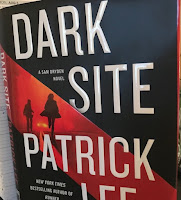Some weeks ago one of the head honchos here at the
FinePrint Lit Bar and Grill forwarded a query to me with the usual "is this for you?" message.
I read it, and yes indeed it was for me. It practically had my name in lights at the top of the query. Never mind that my name is now apparently spelled RUBIE not REID.
But, I digress.
As usual when I get something I think is yummy, and might have already been snapped up by any of my more slithery colleagues, I give the prospect a ring on the phone.
Me: Hello, this is Janet Reid at
FinePrint Lit. You sent us a query on such and such a date and it was forwarded to me since my list is a good fit for what you write.
Hot Prospect: Hello, nice to meet you.
Me: I'm calling to make sure you haven't signed yet with any of my
slithery competitors colleagues whom I'm sure have been chasing after you.
Hot
Prosp: No, no I haven't.
Me: Great, well, I hope you'll be
ok with me reading your book then. I'm eager to get the pages.
HP: Well, no. I don't want you to read it.
Me:
stunned, incredulous silence.
I've NEVER had someone refuse to let me read something. As you can well imagine, it's 100% the other way around, I'm refusing to read stuff left and right.
To say I'm stunned is to say
Stephenie Meyer sold a few books last year.
In the next five
nano-seconds I think the following things:
1. He's read my blog and he thinks I'm a foul mouthed bitch.
2. He's read my blog and he thinks I'm incompetent.
3. He knows me and doesn't like me.
4. He's heard of me and doesn't like me.
Now, these thoughts aren't as lucid as this list. It's mostly just an overwhelming feeling of self doubt and the instant assumption his refusal was about ME.
In the next moment, I have a blinding, and I mean BLINDING, realization that this is how some people who query me react to form rejections. I think the last time there was a bolt like this Saul might have been on the road to Damascus.
Then Mr. Prospect elaborates: "I've decided to re-work the novel and I'm several weeks from having it done. I'd rather send you the revised and polished up version."
Me: Sure, no problem. Glad to get it then.
I tell you this here to illustrate one more time that when you query agents and you get a form rejection, it's not always about YOU. It could be about ME.
It's ME if I'm not enamored of the topic no matter how well written;
it's ME if I'm overwhelmed with work this week, and just can't read one more partial;
it's ME if I've got a project very similar to yours and can't sell it for spit;
it's ME if I can't think of an editor who would buy this book and have no idea where to even start;
it's ME if a colleague handles this genre and I don't want to encroach on his/her turf.
I don't tell you any of this, and I don't apologize for using a form rejection in these cases. I do, and you'll just have to know that.
Sometimes of course it is the writing. But not always. And if you've been paying attention to this blog and others, you've avoided some of the classic mistakes (glitter! photos! fiction novels!) If you've availed yourself of
QueryShark or Evil Editor or any of the other critique sites, you've probably got a decent query.
That means you press ahead. Don't dog paddle around the slough of Despond. Climb out, hose yourself off, and get back to work.
Rule for writers: Be rational. Understand that your first response comes from that reptilian base of your brain. Then engage your thinking brain.







